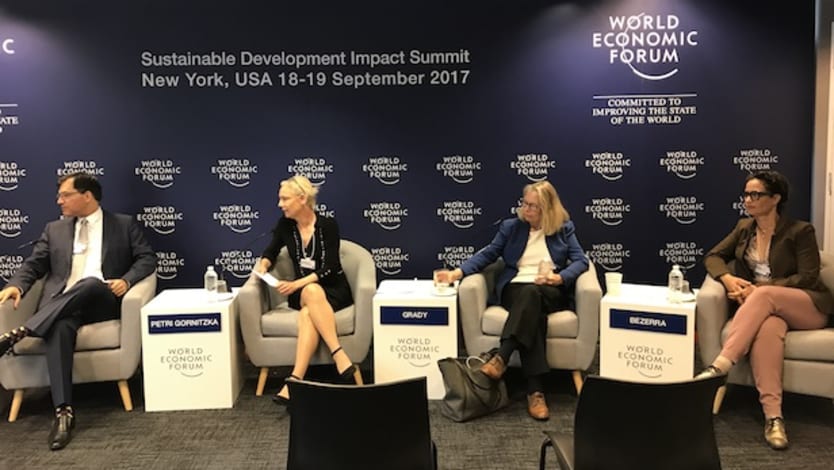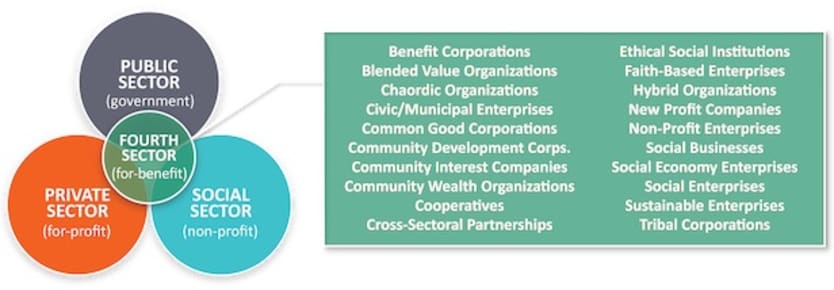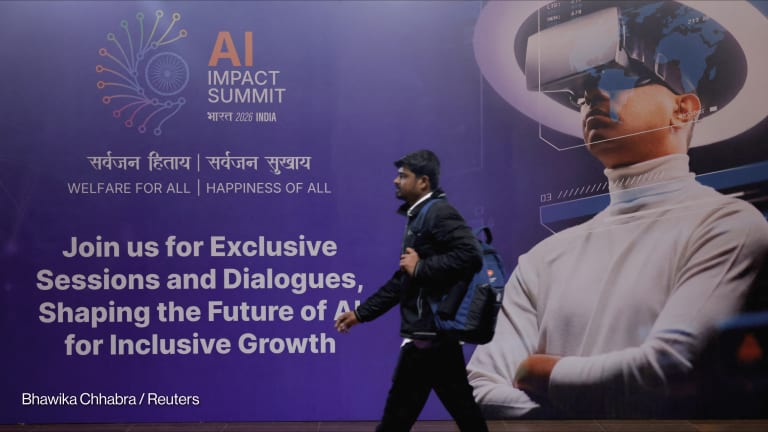
NEW YORK — The World Economic Forum announced Tuesday the creation of an initiative to support “for-benefit enterprises” at its Sustainable Development and Impact Summit.
The Fourth Sector Development Initiative, or FSDI, is intended to strengthen the supportive ecosystem for enterprises that both see advancing societal benefit as their primary purpose — in the same way that nonprofit organizations do — but also generate most of their income from business activities, in the same way that for-profit companies do. These “for-benefit enterprises” go beyond the traditional three sectors of private, public, and nonprofit organizations and belong in their own category, said Heerad Sabeti, CEO of the Fourth Sector Group.
Catch up on Devex coverage of Global Goals Week:
▶ Global Learning XPRIZE finalists chase $10M prize for literacy solutions
▶ Amid global crises, UNGA will show development community rising to the challenges
▶ New UNDP administrator looks to define agency's value, create fresh strategic vision
Sign up for our Global Goals Week daily briefings and visit our Global Goal Week site for full coverage
Sabeti appeared at a press conference during Global Goals Week in New York to discuss the aims of the partnership to advance the sector with WEF’s Global Future Council on International Governance, Public-Private Cooperation, and Sustainable Development. Several organizations are announcing the launch of new initiatives as part of the fourth sector collaborative, including CARE Enterprises, the investment arm of the global NGO, which plans to deploy $30 million in patient capital through flexible deal structures in order to meet the unique needs of for-benefit entrepreneurs.
“‘Social enterprise’ is a somewhat narrower definition and it carries more baggage than the new term ‘for-benefit enterprise,’” Marilia Bezerra, managing partner at CARE Enterprises, and one of 12 members of the founding team for the Fourth Sector Group, told Devex. “A for-benefit entity, for instance, can be a massive global corporation if it decides everything it does is something that is done with a purpose of creating a positive impact in the world.”
One goal of the initiative is to “open up the conversation so that businesses that might never consider themselves social enterprises might work toward becoming for-benefit enterprises,” she added.

Devex asked a range of leaders how this new initiative might facilitate the transition toward an economy that prioritizes people and the planet in order to achieve the SDGs by 2030.
“To achieve the SDGs through private enterprise, you need enterprises that are doing lots of positive good without the negative externalities that often go with private enterprise,” Sabeti told Devex.
The other key, he said, is to link global companies with for-benefit enterprises. Examples noted at the press conference include TOMS, which donates a pair of shoes for each pair sold, and KIND snacks.
At WEF and other events taking place around the United Nations General Assembly, one of the key themes has been the challenge of meaningful business engagement with the SDGs: if you maximize for profit, delegates have said, there is a cost for people and planet, so a new model of business is needed.
This week, Oxfam launched the Future of Business initiative, which will provide for-benefit enterprises with access to finance; connect them with global companies so they can be included in their supply chains; and investigate how having more businesses structured as for-benefits can contribute to its mission of tackling global inequality,
“The fourth sector has a point of departure now,” Charlotte Petri Gornitska, chair of the Organisation for Economic Co-operation and Development’s Development Assistance Committee, said at Tuesday’s press conference during the WEF summit. “I think it will unlock a lot of potential when we talk about civil society, private sector, and government working together.”
She said she hopes to convene the Development Assistance Committee’s members in a roundtable in order to understand how this can benefit donors, and ways they can engage with it. “I foresee member countries who would like to do this also because they need this kind of language around this fourth sector,” she said.
All too often, she continued, members meet with NGOs on one side, and the private sector on the other. Building up the fourth sector will allow stakeholders to come together in one room, and allow donors to work more effectively with the private sector, she said.
One of the challenges facing for-benefit entrepreneurs is access to capital. Standard investment instruments tend to prioritize the need of investors for high financial returns and quick exits. But for-benefit enterprises, particularly in frontier markets, tend to have slower growth that demands patient capital, taking into consideration the challenging contexts in which they operate. CARE Enterprises will offer impact-based loans, performance-based loans, mezzanine debt, and variable payment dividends to meet the needs of for-benefit entrepreneurs.
There are separate ecosystems that allow for-profits and NGOs to be created and scaled. This hybrid landscape of for-benefit enterprises also needs an ecosystem, Sabeti said. In addition to attracting more investment to the for-benefit ecosystem, other forms of support from enabling policy and regulatory environments to tax incentives will be needed, the partners explained at the press conference.
“This is a key part of the solution to achieving the SDGs,” he continued, adding that developing the fourth sector will be critical to make the shift from the billions to the trillions that will be needed to finance the goals.
Devex is on the ground in New York at Global Goals Week, bringing you daily morning briefings with everything you need to know — whether you're here in person or following the events from afar. Sign up for our daily briefings.








